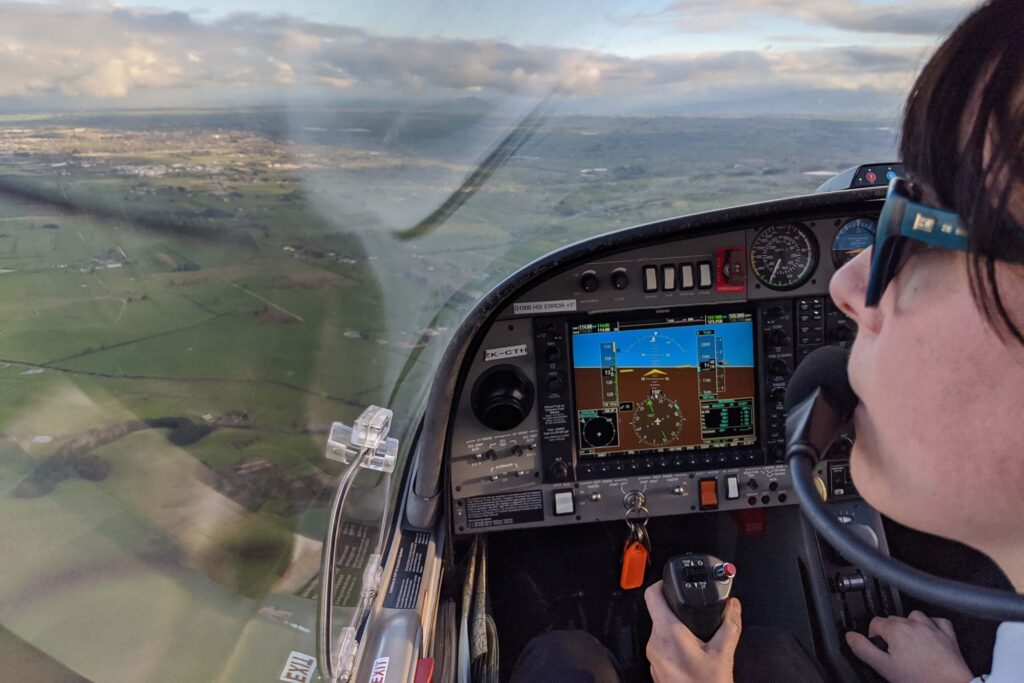In her #MyCovidStory Victoria Bryan shares how she went from being a journalist to pilot… and back again.
When I began my flight training in 2018, the aviation industry was booming. People wanted to travel, Europe’s skies were full to bursting and the manufacturers couldn’t get the planes to airlines fast enough. After a career as an aviation journalist, it seemed as good a time as any to learn how to fly myself.
In New Zealand, where I was building up my hours flying solo around the North Island in a single-engine DA20, I wasn’t unduly concerned by the first reports of an unknown but fast-spreading respiratory virus in early 2020. I remembered how the SARS crisis had hit aviation, sure, but it was relatively contained.
I continued about my flights, enjoying the thrill of my solo 350 nautical mile cross-country qualifying flight to New Plymouth in the shadow of the Mount Taranaki volcano and onto an uncontrolled airfield right next to the south coast before heading for home on a gloriously sunny Sunday. I learned about flying at night and how to remove a cricket from the cockpit on dark night, which certainly wasn’t in the syllabus but was a useful learning point nonetheless.
How wrong I was about that virus. Weeks later, I watched in horror as countries started closing their borders and worldwide travel ground to a halt. I did have a flight booked to the UK in early March but decided to remain in New Zealand as it seemed safer and more likely I would be able to continue my training. It may sound like an easy decision, but I hadn’t seen my family and friends in nine months and they were expecting me back, so it was a tough call. When would I see them again? When would I be able to hug them again?
Being locked down over the other side of the world was a surreal time. My housemates crowded round the TV screen each lunchtime to watch PM Jacinda Ardern and Dr Ashley Bloomfield provide Coronavirus updates. The numbers from New Zealand were tiny compared to the UK. Someone from the flight school would come by a few times a week to check on our welfare, from a safe distance down the driveway of course! Several car batteries all failed coincidentally on one day due to lack of use. As we were living in separate houses and weren’t allowed to mix, one cadet spent a lot of time each week coming up with questions for pub quizzes over Zoom. We made sure to take our government-sanctioned daily exercise by walking around a nearby lake.
Amazingly, New Zealand was successful in containing the virus, thanks to its strict border closure policy and tough lockdown, and my flying resumed in May after a two month hiatus. A highlight was passing my Commercial Pilot’s Licence skills test first time around on a somewhat cloudy day in September. With travel restricted in the rest of the world, I also made sure to see as much of New Zealand as I could, and hired a campervan to explore the South Island with some fellow trainees. The trip included a night under the stars in Lake Tekapo and a magical early morning hike through the snow to the foot of Aoraki (Mount Cook). It wasn’t until October that I returned to the UK, eight months later than planned, where I successfully completed my multi-engine instrument rating in January.
While my flight training has progressed, albeit with delays related to Coronavirus and other factors, my career plans have been turned upside down. I had expected to be at an airline by now, getting the airline-specific training to land powerful jets, and safely fly hundreds of passengers to their destinations.
Instead, I am back at my mum’s in my childhood home town, searching for non-flying work, while continuing to see negative headlines about the pandemic’s effect on aviation. I fully expect it to be at least another year before Europe’s airlines will look to hire freshly qualified pilots like myself with low hours. Firstly though, I really hope all those pilots who got made redundant or furloughed as a result of Coronavirus get their jobs back.
Fortunately, I have a previous career as a journalist to fall back on, so I have more options than many other trainees. The career of a pilot has always been a fragile one – medical problems, global downturns, a company going bust can all lead to a swift grounding. I have heard many people say that it is crucial to have a back-up career. Never has it been more true for pilots than in this crisis.
A real issue facing me now is skills fade. As a new pilot, I really want to keep my skills up because it’s only with practice they become second nature. While I wait for airlines to start hiring again, my plan is to find work as a journalist and use any spare cash to keep flying single engine planes on the weekends or spend time in the simulator.
It may take me longer than I initially expected, but I believe soon I will be flying you on holiday and saying those magic words: “Ladies and gentleman, this is your first officer speaking…”
